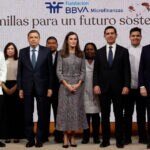The Queen of Spain visits the BBVA Microfinance Foundation to learn how small cocoa producers create jobs and combat poverty
Three micro-entrepreneurs running small cocoa farming businesses were the stars of ‘Seeds for a sustainable future’, an event organized by the BBVA Microfinance Foundation under the presidency of Queen Letizia of Spain. The Queen, who underlined the Foundation’s invaluable work in supporting the progress of millions of people, was accompanied by BBVA Chair Carlos Torres Vila and by renowned pastry chef Jordi Roca.

In her opening speech at the event held at the Foundation's headquarters in Madrid, the Queen stressed that, in Latin America, "Three million micro-entrepreneurs can move forward every day because someone trusted them and supported their idea of starting a microenterprise." She emphasized that these individuals "make progress and grasp opportunities to train themselves, while their children have the chance to study thanks to the microcredits provided by the BBVA Microfinance Foundation." The Queen also underscored the vital role of these small businesses in the global economy, stating that "according to the United Nations, MSMEs account for 70 percent of global employment."
During her address, Queen Letizia pointed out the stories of Marlon Ferreira, Constantino Blandford and Ana Rodríguez, three small cocoa farmers supported by local entities of the FMBBVA in Colombia, Panama and the Dominican Republic. During the same event, these three entrepreneurs took part in the colloquium by explaining how their businesses helped to support the development of their local communities.
Furthermore, BBVA Chair Carlos Torres Vila stressed that these entrepreneurs “are an example of sacrifice, strength and capacity to move forward. If something inspires us, it is their will and their determination to go further.” In his opinion, they face major challenges in their day-to-day lives, including access to finance, adaptation to climate change and the digital divide.
To make further progress in the digital arena, “FMBBVA has brought the Internet, via satellite technology, to remote areas of Colombia and Peru…” while also relying on cutting-edge digital tools, such as facial or voice biometrics or AI chatbots to offer financial services to these micro-entrepreneurs, he added.

BBVA Chair Carlos Torres Vila during the event. - FMBBVA
The BBVA Chair also remarked that one of BBVA’s objectives “is to support our customers in their transition to a more sustainable energy model” and shared several examples of how the BBVA Microfinance Foundation is working to mitigate the impact of climate change on their businesses: from climate vulnerability maps used to design and offer solutions tailored to the needs of small entrepreneurs, to parametric insurance that covers businesses against natural disasters associated with climate change. For this kind of insurance, payments are calculated automatically and vary according to the degree of impact, which is monitored closely by satellite.
MSMEs, essential for growth and development
Micro, small and medium-sized enterprises (MSMEs) are a bedrock of the global economy. They account for 90 percent of all companies and contribute 50 percent of GDP, according to the United Nations. In Latin America, where MSMEs make up 99 percent of the business community, their work creates jobs, empowers women and reduces poverty.
In this regard, Javier M. Flores, managing director of the FMBBVA, remarked that the work of small entrepreneurs “is a seed for economic and social change because when small businesses prosper, so do their communities and with them, society as a whole.”
Cocoa: the seed needed for transformation to take root
Cocoa production in the home countries of the three entrepreneurs who took part in the event (Colombia, Panama and the Dominican Republic) directly employs more than 200,000 people and offers opportunities for the educational advancement of cocoa bean farming families.
“My mother always said that chocolate was more than just a sweet; it was also an opportunity,” said Marlon Ferreira, who at 29 is the founder of Maluwa Chocolate Company, a company that has won various international awards and whose chocolate bars are sold in Colombia and the United States. A success story that would not have been possible without the cocoa it buys from Colombian farmers who, in many cases, have replaced their coca leaf plantations with what they call the “fruit of peace.” This change has improved the local economy and is paving the way for a more stable future for the country.

Jordi Roca, co-owner of world-renowned restaurant El Celler de Can Roca. - FMBBVA
In Panama, “cocoa is more than a crop: it is a way of life that has been passed down from father to son,” adds Constantino Blandford, who belongs to the Ngäbe Buglé ethnic group. These indigenous people, who live in the westernmost part of the country, still rely on ancestral techniques to produce organic cocoa, which helps to preserve biodiversity and care for the environment.
Ana Rodríguez from the Dominican Republic also comes from a cocoa-growing family and is the leader of Las Productivas, a cooperative set up following the devastation wrought by Hurricane George in 1998: “We came together to survive, though over the years we came to realize that we could do much more than just that.” Today, they make chocolates and jams made from cocoa and encourage and foster the participation of young women in the industry. Their products are marketed in local stores, supermarkets and in haute cuisine restaurants, such as those of Chef Tita, an ambassador of Dominican cuisine who made the 2024 Best Chef Awards list.
The event culminated with an address given by another of the world’s top chefs: Catalan pastry maestro Jordi Roca. The co-owner of world-renowned restaurant El Celler de Can Roca, who had visited the cocoa farmers of the BBVA Microfinance Foundation back in 2019, announced that he will soon be traveling to Constantino’s plantation to learn more about the cocoa he produces and to use it in his Casa Cacao workshop: “Cocoa is not just an extraordinary taste; it is a living history that connects entire communities to the world.”